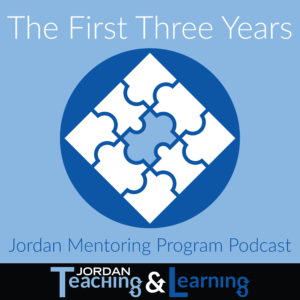Author: awood
Episode 7: Helping Students Thrive During Testing
 In this episode of The First Three Years, we talk about test anxiety and how it can affect teachers and students. We interview Brooke Anderson, JSD Evaluation, Research, and Accountability Teacher Specialist, about how teachers should view end of year testing and ways to help calm any anxiety about the tests. We also interview McKinley Withers, JSD Administrative Specialist Health & Wellness, about how teachers can support their students through testing.
In this episode of The First Three Years, we talk about test anxiety and how it can affect teachers and students. We interview Brooke Anderson, JSD Evaluation, Research, and Accountability Teacher Specialist, about how teachers should view end of year testing and ways to help calm any anxiety about the tests. We also interview McKinley Withers, JSD Administrative Specialist Health & Wellness, about how teachers can support their students through testing.
Both Brooke and McKinley are happy to help you if you have questions.
Podcast: Play in new window | Download
Episode 6: Engaging and Helping Students Thrive Through Playing and Creating
In this episode of The First Three Years, we will explore the idea of bringing back playing and creating to the classroom and the impact it can have on student learning, especially during remote learning due to COVID-19.
We interviewed Cally Flox, Director of BYU Arts Partnership, and she shared some ideas of how to get students out of their seats to better their instruction time.
Cally would love to hear about the successes you are having in your classroom as well as questions you may have about creating an atmosphere of play and create in your classroom K-12. Visit her website below for some great ideas.
Cally_flox@byu.edu
http://advancingartsleadership.com/
Music: https://www.purple-planet.com
Podcast: Play in new window | Download
I Made It Through My Provisional Years, Now What?
Surviving the first few years of teaching is huge! New teachers are busy during those years getting a handle on all the teaching things -- management, planning, teaming and data diving, improving engagement strategies, surviving their evaluation...the list goes on! As they get to the end of the provisional years and see all their growth, some new teachers ask the question, “Now what? What can I do to continue to grow?”
Jordan School District has some great opportunities available for teachers to continue their education and learning. There are several endorsements that are offered through the district. Some of these endorsements even tie into master’s programs. One perk of these credits is they can help you advance on the pay scale!
If you are interested in endorsements that are offered through our district, here’s a list and some contact information.
- ESL Endorsement: The ESL Endorsement is offered through Southern Utah University. Teachers can use credits from the class towards a master’s degree. For more information about this endorsement, contact Sheri Sample: sheri.sample@jordandistrict.org
- Technology Endorsement: The technology endorsement is offered through Utah Valley University. This endorsement can be used towards a master’s program. For more information on this program, contact Deanna Taylor: dtaylor@jordandistrict.org
- Gifted and Talented Endorsement: The GT Endorsement is offered through Southern Utah University and can be tied to a masters program. For more information on the GT endorsement, contact Rebecca Smith: rebecca.smith@jordandistrict.org
Elementary Endorsements:
- Math Endorsement: The math endorsement is offered through Utah Valley University. The credits earned can be used towards a master’s program. For more information on the math endorsement, contact Melissa Garber: melissa.garber@jordandistrict.org
- Reading Endorsement: The reading endorsement is offered through Utah Valley University and can also be used towards a master’s program. For more information on the reading endorsement, contact Laury Finch: laurene.finch@jordandistrict.org
Many universities around the area offer endorsement programs as well. Check their course catalogs for more information.
Episode 5: Thriving Through JPAS Reflection and Growth

In this episode of The First Three Years, we will explore JPAS and how it can help you reflect on your teaching practices so you can set realistic goals for growth. We interview three JSD principals, Shawn McLeod, Kim Searle and Tami Bird, to get a principal’s perspective on how they use JPAS to help teachers thrive.
As you receive your JPAS results; if you would like specific goal setting assistance please contact your school’s instructional coach or your mentor teacher specialists. We would be happy to help you.
Music: https://www.purple-planet.com
Podcast: Play in new window | Download
The Half Year Reflection
Half a year of teaching is complete; you have gone through the disillusionment phase, and now you are learning from your previous months of experience. Reflection begins and rejuvenation happens. You are in a busy but great moment!

How will you reflect, improve and change? You should reflect on what kind of learning has taken place with your students; does your data show the growth youhope they have experienced? Do you need to change or revamp the way you teach or do something? Could your classroom management be strengthened? Now is the time to evaluate and try something new. This is the joy of being an educator. We can always try something new and make it an adventure with our students. They are willing to help you become a successful teacher, and if you approach the changes you want to implement as changes that will help them be a more successful student, you should have positive feedback from your students.
Don’t be afraid to fail; we grow from failure when we learn from our mistakes. It makes us stronger, resilient and better. An effective teacher is one who continues to learn, improve and change. Those who are the same throughout their career are not the innovative and dynamic teachers students seek to learn from. We wish you success in your career adventure!
Midyear Shakeup
January is a good time to reflect on procedures in the classroom. This can be an opportunity to reteach procedures to make the class run smoothly.
- Develop plan to get attention
- Develop plan to eliminate distractions
 Plan for classroom shakeup--CONSISTENCY IS THE KEY
Plan for classroom shakeup--CONSISTENCY IS THE KEY- Find the right demeanor
- Focus on being a mentor not a friend
- Focus on being respected not being liked
- Be kind (personable, nice, understanding)
- Be firm (high expectations, deal with issues, don’t be a pushover)
- Execute classroom procedures
- Give detailed instructions
- Practice
- Correct anything done wrong
- Redo the practice
- Deal with problems when small
- Stay Consistent
If you feel that your classroom would benefit from a shakeup and want help, contact your building instructional coach or your mentor specialist.
Episode 4: Thriving Through Goal Setting and Change
 In this episode of The First Three Years, we focus in on creating change in our classrooms. We interview Melinda Boyack, a first grade teacher at Silver Crest Elementary, about her experience working with instructional coaches to improve her teaching and benefit her students. We also interview Amy Kinder, JSD Teaching and Learning's Math Consultant, about setting goals with an instructional coach.
In this episode of The First Three Years, we focus in on creating change in our classrooms. We interview Melinda Boyack, a first grade teacher at Silver Crest Elementary, about her experience working with instructional coaches to improve her teaching and benefit her students. We also interview Amy Kinder, JSD Teaching and Learning's Math Consultant, about setting goals with an instructional coach.
If you need help working toward goals for your students and your classroom, reach out to your school instructional coach or your mentor teacher specialist.
Music: https://www.purple-planet.com
Podcast: Play in new window | Download
Setting Goals and Making Changes
A new year brings changes and new challenges. It is a time to set goals and look to the future.

Jennifer Gonzalez, from the Cult of Pedagogy, shared some ideas for setting goals as a teacher:
- strengthen your tech skills
- brush up on pedagogy
- improve classroom management
- adjust your mindset
- get organized
Goal-Setting for Teachers: 8 Paths to Self-Improvement
Sometimes new goals bring about changes in what we do. Some important positive strategies for coping with change and transition in life are that were shared on the blog posted below:
- stay flexible
- care for your physical and emotional health
- maintain your life flow by keeping some kind of ‘routine’
- stay in touch with friends and social networks
- use stress reduction techniques such as mindfulness, meditation, breathing exercises
- start a wish list of new plans and goals to fit your new circumstances
- embrace the new changes
- take it one step at a time
- keep your sense of humor
- talk to helpful people, such as a counsellor or someone you can trust
- do not allow yourself to be vulnerable, but stay safe in whatever way you need
Don't Suffer in Silence - Enough is Enough Blog: Coping with Change and Transition in Life
“Where Attention Goes, Behavior Grows”
You may have heard it said, "Where attention goes, behavior grows."
What does this mean though? The Tough Kid Book, by Rhode, Jensen, and Reavis, says: "If more teacher attention is given for inappropriate student behavior than for appropriate behavior, the inappropriate behavior will increase. With Tough Kids' teachers, this attention very often takes the form of excessive prompting, reminding, threatening, reprimanding, and verbal abuse, because these reactions seem to come naturally when teachers attempt 'pain control' of their own" (43).

Where is your attention going in your classroom? Are you feeding the negative actions of students and reinforcing the behaviors you don't want to see? What is your attention growing?
If you are feeling that some of these natural management tendencies (excessive prompting, reminding, threatening, reprimanding, and verbal abuse) are emerging in your teaching, maybe it is time to re-evaluate how you look at the Tough Kids' behavior. The Tough Kid Book has various strategies to try. You can access The Tough Kid Book in all JSD schools by checking with your school psychologist.
Strategies from The Tough Kid Book:
- Positive Reinforcement (45): occurs when something a student desires is presented after appropriate behavior has been exhibited. All students and adults need legitimate and appropriate reinforcement.
- Example: Calvin can earn up to ten points for completing his reading assignment correctly. The points can be exchanged for dinosaur stickers. Because Calvin enjoys the stickers he can earn, the accuracy of his reading assignments has increased.
- Motivation and Encouragement (48): motivating and encouraging desired performance is much the same in the classroom as it is in the business world.
- Step 1. Tell students what you want them to do (and make sure they understand it).
- Step 2. Tell them what will happen if they do what you want them to do
- Step 3. When students do what you want them to do, give them immediate positive feedback in ways that are directed and meaningful to them.
- Natural Positive Reinforcement (50): Natural (activities or things that students already find rewarding) forms of reinforcement are found in schools if you look for them. Some tips for selecting positive reinforcement:
- Select age-appropriate reinforcement.
- Use natural reinforcement whenever it is effective.
- Use reinforcement appropriate to the student's level of functioning.
- Make certain you have parental and administrative support for the reinforcement you plan to use.
- Avoid partial praise statements, such as "I'm glad you finished your work--finally!"
- Always make the most of opportunities to reinforce appropriate behavior.
- Be genuinely polite and courteous to Tough Kids at all times and demonstrate concern and interest toward them. Always stay calm.
- Do not confuse positive reinforcement or privileges with a student's basic rights.
For more tips and ideas, see:
Rhodes, Ginger, William R. Jenson, and H. Kenton Reavis. The Tough Kid Book. Eugene: Pacific Northwest Publishing, 2010.Opens in a new window
